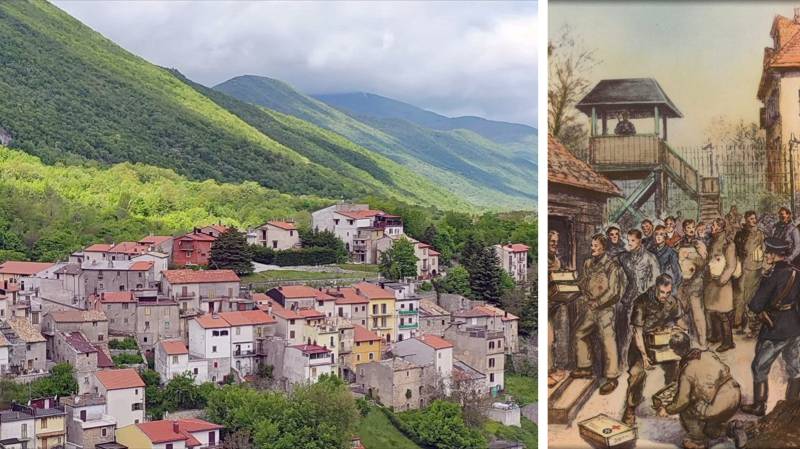
Southeast of Rome, in the Abruzzo region of Italy, is a relatively remote town within the Appenine mountains, that is the last habitation on the routes leading into the Abruzzo National Forest. Named Villavallelonga (the residence in the long valley), it was first settled in the 5th century as people fled from the barbarian invasions of Rome. Fifteen centuries later, during the Second World War when the Allied and Commonwealth POWs escaped after Italy capitulated, many ended up spending the winter in and around Villavallelonga. The German lines to the south at Monte Cassino were difficult to penetrate, the terrain was harsh and winter was setting in. Villavallelonga claims to have helped over 400 escapees – two of whom would attain very high ranks in their respective armies: Gen PPK Kumaramanglam and Lt Gen Sahabzada Yaqub.
General Yahya Khan, who shared one of the POW camps with Yaqub, used to say that he never tried to escape. The History of the Baluch Regiment narrates how Yahya escaped from a camp at Rimini along with Hissam Effendi and PPK Kumaramanglam, but Yaqub and Tikka stayed back. However, while researching the book I wrote on Yaqub’s POW days, I found evidence to the contrary.
Firstly, Yaqub was not at the POW camp at Rimini but at Avezzano, which was 350 km to the south. Secondly, contained in the wealth of material on his stay in POW camps that Yaqub’s nephew Aarif shared with me, there was a letter from GHQ Delhi to Yaqub’s brother in Rampur. It informed him that Yaqub had successfully escaped to Switzerland. However, in a subsequent letter, GHQ apologised for being wrong, and said that Yaqub had escaped in early October but his whereabouts were not known.
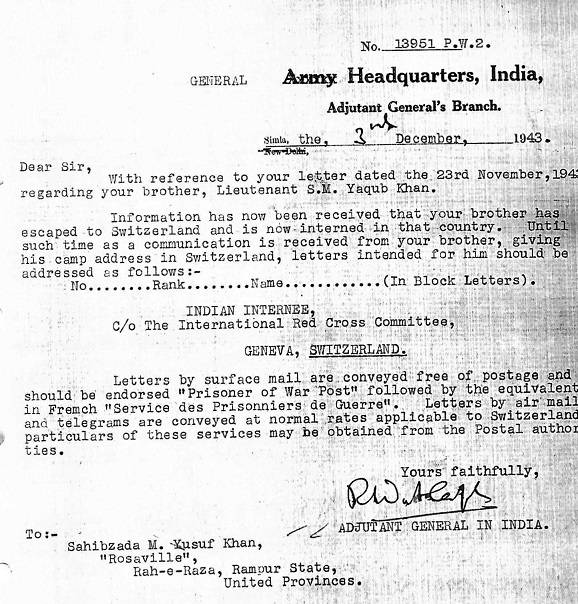
Fortunately, sometime in October 2019, I was introduced to Annu Palakunnathu Matthew, a Professor of Art at the University of Rhode Island. She has been working on a project related to The Forgotten Indian Soldiers of World War II that also focused on the Indian POWs held in Italy. We found that there was a lot to share, and this is the story of how Annu and I over three years, unravelled the mystery of SYK’s escape saga. It’s also a story about how Indians and Pakistanis can work together in areas such as researching/compiling our shared history in which there is no politics involved.
Yaqub and Kumaramanglam (Maj K), escaped from Avezzano when Italy capitulated on September 13, 1943, and were recaptured in early January 1944 by the Germans who netted most of the escapees. This is evident from a prewritten postcard that Yaqub wrote on January 5, 1944, from a POW transit camp in L’Aquila, informing his brother that he was now in German captivity.
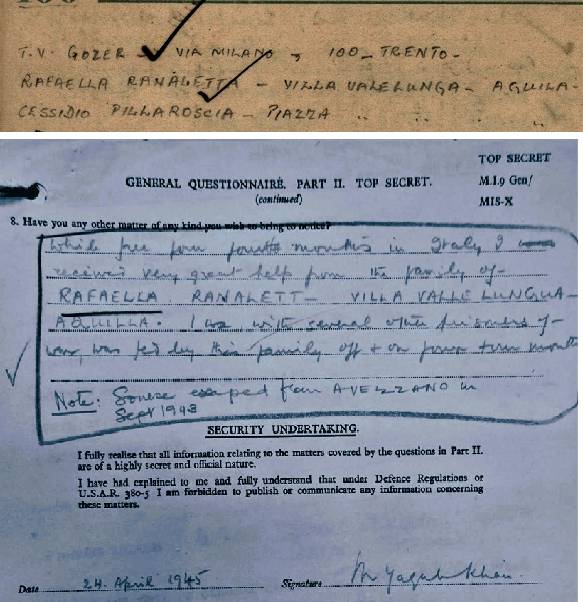
Top: Extract from Sahabzada Yaqub’s diary, showing the three names and addresses of Italians, including Rafaella
Bottom: Extract from a questionnaire filled by Yaqub after liberation, acknowledging the help provided by Rafaella and her family
Where were they for three months? Ambassador Shahid Kiani gave me a set of two pictures of Yaqub taken in Italy in 1984, when Shahid was the Third Secretary at the embassy in Rome. According to him, these pictures were of a day's trip that Yaqub had taken to a town to thank them for their kindness in harbouring him as an escapee in 1943. Unfortunately, he could not recollect where Yaqub went and the embassy had no record. However, within the six pages of addresses in Yaqub’s diary were the names and addresses of three Italians: one in Trento north of Rome, and two in Villavallelonga.
Since the letter from GHQ implied that he was making for Switzerland, at first Trento seemed a good bet, since it was fairly close to the Swiss border. However, it is 700 km from Rome and not within a day's trip that Yaqub made in Italy. So, it had to be Villavallelonga – but that was only a starter. Annu and I had been sharing information that we felt would be useful to each other and while I worked on my book, she remained busy on her project. Commencing from September 2021, her photographic exhibition on “The UNREMEMBERED: Indian Soldiers of WW II” was displayed by the Newport Art Museum. She concurrently exhibited the pictures digitally through the library of the University of Rhode Island and included an article that I wrote on my uncle, “An Indian Prisoner in German Captivity.”
In the meantime, I received an offer from Paramount, a large publishing house in Pakistan, to publish my book. I accepted gladly and within three months it was in the bookshops. Sadly, it contained very little information specifically related to Yaqub’s three months of freedom in the Italian countryside. But I was hoping that the next edition would have more.
Unexpectedly my friend and author Ghee Boman provided some valuable information. After publishing a book on the Indian Contingent at Dunkirk, he is now working on his second book, The Great Indian Escape, which focuses on Indian POWs in Europe during the Second World War. During his research at the UK National Archives at Kew, he found a questionnaire for ex-POWs filled in by Yaqub, who while replying to a question on escaping, confirmed that he and Kumaramanglam were together. He also wrote that. “While free for four months in Italy, I received very great help from RAFELLA RANALETTA – VILLA VALLE LUNGA, AQUILA. I with several other prisoners of war, was fed by this family off and on for three months.”
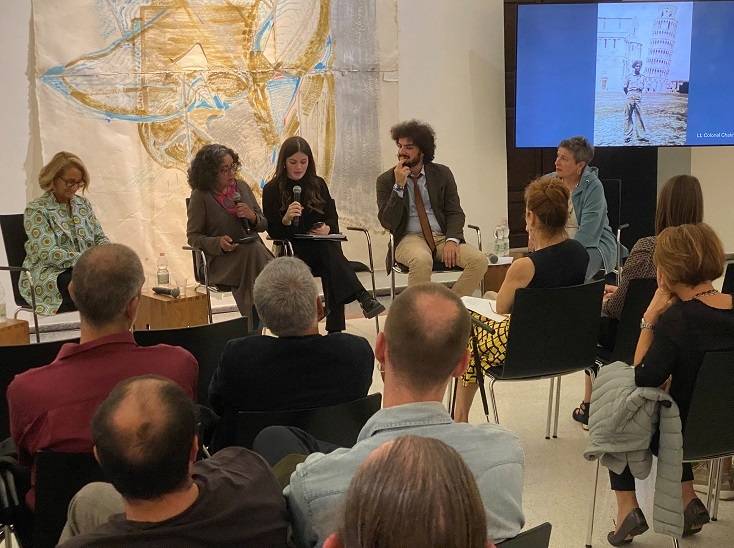
I now had the name of the place and the person who provided sanctuary to Yaqub and others. I had found a similar questionnaire at Kew filled in by Maj K, but it was frustrating to see that, the page containing details of his escape attempt was missing.
Meanwhile, Annu remained busy with her project and I started working on my next book – a pictorial biography of Yaqub based on his 40 albums that had been digitally scanned. Then in the summer of 2022, Annu visited Italy to further research her project. While in Avezzano, she showed around the two pictures of Yaqub, and to our good luck the nephew of Romano, who had also sheltered some Indian POWs, recognised the man in one of the pictures as Domenico Grande. The nephew had been a teacher when Domenico had been the Director of High Schools in Avezzano, and confirmed that Domenico had lived in Villavallelonga. It was a great breakthrough, and Villavallelonga was only 35 km to the south of Avezzano, but Annu didn’t have the time on this trip to visit it.
In October this year (2023), Annu was invited by the MAXXI Museum at L’Aquila, Italy, to talk about her research on the people of Abruzzo – some of whom had risked their lives to save these Indian soldiers. Her presentation mentioned that she was trying to trace the lady in Villavallelonga who had provided refuge to SYK. Someone there knew a family from Collelongo, the town next door. Being so close, Annu visited Villavallelonga, where she had a chance encounter with an elderly lady who was just about to leave the coffee shop where she worked the early shift. She recognised the woman with Yaqub in the photo and called a customer, Emanuela, to translate. Emanuela happened to work for the city of Villavallelonga, and later that day, she located a niece of Rafaella. Annu was updating me at every step and with great interest I watched as she pried open the secret of Yaqub’s escape saga.
Unfortunately, Annu was departing for the US the next day and couldn’t meet the niece, but Annu’s translator took on the search and informed us that the woman with Yaqub in the picture was not Rafaella but Maria Lippa, a deaf-mute woman who probably also helped the escapees. The jewel in the crown was four pages that she obtained from a book called Villavallelonga Segreta (The Secret of Villavallelonga). These pages in Italian which were translated by my friend Romano, recounted the entire episode of Yaqub’s visit to Villavallelonga in 1983.
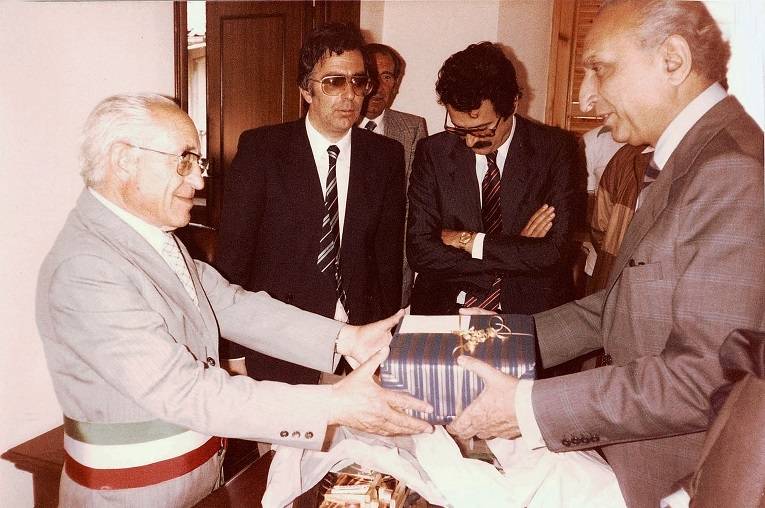
It says that on a state visit to Pakistan in March of 1982, the Italian Foreign Minister Colombo met his counterpart and was surprised when Yaqub asked him in Italian the news from Villavallelonga. Colombo was taken aback: not so much because Yaqub spoke Italian, but more so because his Pakistan counterpart told him that this small village in the Abruzzo had saved him in 1943 when he escaped from the Nazis after a prison break from Avezzano. As such he had a personal debt towards the people who helped him. On his return to Rome, Colombo’s office obtained the history of Villavallelonga in two volumes, which were gifted to Yaqub. Yaqub Khan appreciated this welcome gift that reminded him of his days of youth and he wrote back to the author a letter in English dated June 7, 1983.
In a letter of appreciation reproduced in the book, Yaqub wrote, “I shall surely read with great interest about the history of a village where I had the good fortune to receive unforgettable hospitality and succour, as an escaped prisoner of war in the autumn of 1943. The kindness, warmth, and generosity of the people of your great country were demonstrated to me during these difficult days in a manner that has remained engraved in my memory. I look forward to the opportunity of visiting that region, when the opportunity permits, to be able to convey personally my deep sense of gratitude and look forward to the pleasure of meeting you.”
He also mentioned that in New Delhi he met his companion in this adventure whom he had met at Villavallelonga and whom he addressed as the ‘major’ (ie, Gen Kumaramanglam). Together they remembered the escape and evasion into the mountains of Villavallelonga and the invaluable assistance received from the citizens and in particular from the family of Rafaella.
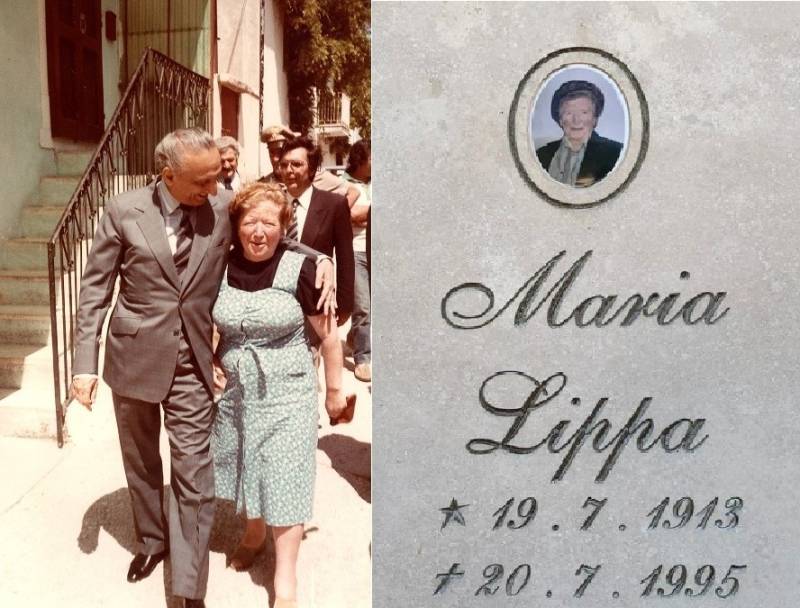
Left: one of the deaf-mute siblings that Yaqub befriended in Villavallelonga in 1943
Right: The memorial tablet of Maria, whom Yaqub is seen embracing
When the 1943 Armistice was announced between Italy and the Allies, the Italian guards at all the POW camps departed, and there was a mass escape by most of the 400 officers and 2,700 soldiers held captive at Avezzano. There was an immediate alarm and a contingent of German paratroopers was able to recapture 800 escapees. Many of those who reached the mountains around Villavallelonga were provided refuge till the area was liberated nine months later. During this period, the German troops helped by the Italian Fascists continued to search for the escapees, who if found were invariably shot along with those who were sheltering them. Villavallelonga was threatened with extermination on October 11 and on December 6, 1943, but the generous and courageous locals continued to assist and feed the escapees who were hiding in the forest and hills surrounding the town. However, as winter set in, they needed shelter.
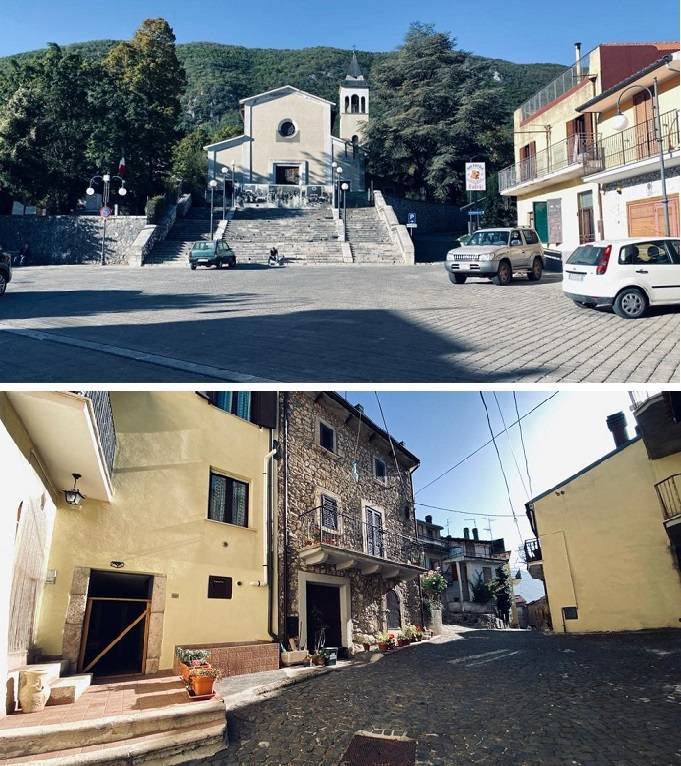
Top: The town square of Villavallelonga
Bottom: One of the streets of the town
Rafaella, who had worked as a ballerina in the Can Cans of Paris, during very cold nights hosted Yaqub and Maj K, who would return to the forest before daylight. Driven by jealousy or greed, someone tried to have these escapees captured. However, Rafaella hid Yaqub (whom the family had nicknamed Ali) and his Indian friend, in a hole under the floor that was covered by a table. In case of a search by the Germans, she would gather her children and sit around the table.
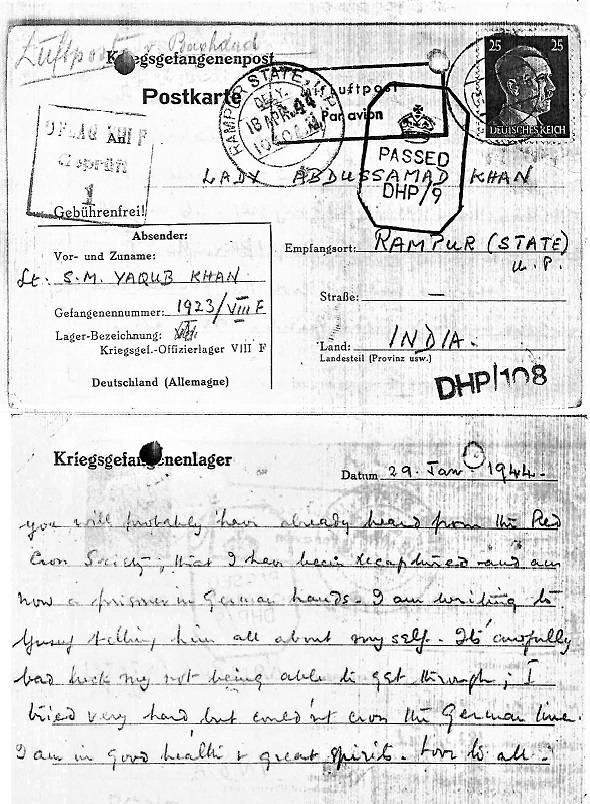
During a working visit to Rome in June 1983, Yaqub made a day trip to Villavallelonga to thank its people who in his moment of need had demonstrated such solidarity even at great risk. In a small ceremony, Mayor Domenico Grande granted him honorary citizenship to the village of Villavallelonga. He then participated in the inauguration of a small church, after which he was embraced by many including Maria and Nicolino Lippa, two deaf-mute siblings whom he had met in 1943 and had befriended. The day however ended on a sad note. Yaqub wanted to meet Rafaella to offer her a gift as a token of respect, but he was told that just after the end of the war in July 1945, she had been killed – shot just a short distance from the village.
Annu tried to locate the house where Rafaella had lived and given refuge to Yaqub and Maj K but it no longer existed and the street had been reconstructed. The extract from the book does not say how the two officers were captured but in a biography of Maj K, the author writes that fearing that if he was caught the person providing him refuge would be shot, Maj K surrendered to the Germans. Yaqub may well have done the same.
Author’s note: I am indebted to Annu Matthew for all the help that I have described above and much more in writing my book on Sahabzada Yaqub Khan. Pursuits and Experiences as Prisoners of War, published by Paramount Books. If the reader finds this article interesting he can order the book online here.

